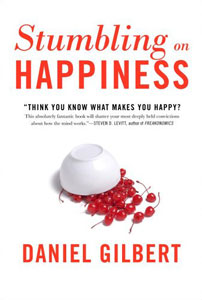Related Research Articles
The unconscious mind consists of processes in the mind that occur automatically and are not available to introspection. Although these processes exist beneath the surface of conscious awareness, they are thought to exert an effect on conscious thought processes and behavior. Empirical evidence suggests that unconscious phenomena include repressed feelings and desires, memories, automatic skills, subliminal perceptions, and automatic reactions. The term was coined by the 18th-century German Romantic philosopher Friedrich Schelling and later introduced into English by the poet and essayist Samuel Taylor Coleridge.
In social psychology, fundamental attribution error (FAE), also known as correspondence bias or attribution effect, is a cognitive attribution bias where observers underemphasize situational and environmental factors for the behavior of an actor while overemphasizing dispositional or personality factors. This effect has been described as "the tendency to believe that what people do reflects who they are"; that is, to overattribute their behaviors to their personality and underattribute them to the situation or context. Although personality traits and predispositions are considered to be observable facts in psychology, the fundamental attribution error is an error because it misinterprets their effects.
Introspection is the examination of one's own conscious thoughts and feelings. In psychology, the process of introspection relies on the observation of one's mental state, while in a spiritual context it may refer to the examination of one's soul. Introspection is closely related to human self-reflection and self-discovery and is contrasted with external observation.
In psychoanalytic theory, a defence mechanism, is an unconscious psychological operation that functions to protect a person from anxiety-producing thoughts and feelings related to internal conflicts and outer stressors.

Lee David Ross was a Canadian-American professor. He held the title of the Stanford Federal Credit Union Professor of Humanities and Sciences at Stanford University and was an influential social psychologist who studied attributional biases, shortcomings in judgment and decision making, and barriers to conflict resolution, often with longtime collaborator Mark Lepper. Ross was known for his identification and explication of the fundamental attribution error and for the demonstration and analysis of other phenomena and shortcomings that have become standard topics in textbooks and in some cases, even popular media. His interests included ongoing societal problems, in particular protracted inter-group conflicts, the individual and collective rationalization of evil, and the psychological processes that make it difficult to confront societal challenges. Ross went beyond the laboratory to involve himself in conflict resolution and public peace processes in the Middle East, Northern Ireland, and other areas of the world.
In the psychology of affective forecasting, the impact bias, a form of which is the durability bias, is the tendency for people to overestimate the length or the intensity of future emotional states.

Gerd Gigerenzer is a German psychologist who has studied the use of bounded rationality and heuristics in decision making. Gigerenzer is director emeritus of the Center for Adaptive Behavior and Cognition (ABC) at the Max Planck Institute for Human Development and director of the Harding Center for Risk Literacy, both in Berlin.
Self-knowledge is a term used in psychology to describe the information that an individual draws upon when finding an answer to the question "What am I like?".

Daniel Todd Gilbert is an American social psychologist and writer. He is the Edgar Pierce Professor of Psychology at Harvard University and is known for his research with Timothy Wilson of the University of Virginia on affective forecasting. He is the author of the international bestseller Stumbling on Happiness, which has been translated into more than 30 languages and won the 2007 Royal Society Prizes for Science Books. He has also written essays for several newspapers and magazines, hosted a non-fiction television series on PBS, and given three popular TED talks.
The adaptive unconscious, first coined by social psychologist Daniel Wegner in 2002, is described as a set of mental processes that is able to affect judgement and decision-making, but is out of reach of the conscious mind. It is thought to be adaptive as it helps to keep the organism alive. Architecturally, the adaptive unconscious is said to be unreachable because it is buried in an unknown part of the brain. This type of thinking evolved earlier than the conscious mind, enabling the mind to transform information and think in ways that enhance an organism's survival. It can be described as a quick sizing up of the world which interprets information and decides how to act very quickly and outside the conscious view. The adaptive unconscious is active in everyday activities such as learning new material, detecting patterns, and filtering information. It is also characterized by being unconscious, unintentional, uncontrollable, and efficient without requiring cognitive tools. Lacking the need for cognitive tools does not make the adaptive unconscious any less useful than the conscious mind as the adaptive unconscious allows for processes like memory formation, physical balancing, language, learning, and some emotional and personalities processes that includes judgement, decision making, impression formation, evaluations, and goal pursuing. Despite being useful, the series of processes of the adaptive unconscious will not always result in accurate or correct decisions by the organism. The adaptive unconscious is affected by things like emotional reaction, estimations, and experience and is thus inclined to stereotyping and schema which can lead to inaccuracy in decision making. The adaptive conscious does however help decision making to eliminate cognitive biases such as prejudice because of its lack of cognitive tools.

Psychodynamics, also known as psychodynamic psychology, in its broadest sense, is an approach to psychology that emphasizes systematic study of the psychological forces underlying human behavior, feelings, and emotions and how they might relate to early experience. It is especially interested in the dynamic relations between conscious motivation and unconscious motivation.

Stumbling on Happiness is a nonfiction book by Daniel Gilbert, published in the United States and Canada in 2006 by Knopf. It has been translated into more than thirty languages and is a New York Times bestseller.

Richard Eugene Nisbett is an American social psychologist and writer. He is the Theodore M. Newcomb Distinguished Professor of social psychology and co-director of the Culture and Cognition program at the University of Michigan at Ann Arbor. Nisbett's research interests are in social cognition, culture, social class, and aging. He received his Ph.D. from Columbia University, where his advisor was Stanley Schachter, whose other students at that time included Lee Ross and Judith Rodin.

Evolutionary educational psychology is the study of the relation between inherent folk knowledge and abilities and accompanying inferential and attributional biases as these influence academic learning in evolutionarily novel cultural contexts, such as schools and the industrial workplace. The fundamental premises and principles of this discipline are presented below.
John A. Bargh is a social psychologist currently working at Yale University, where he has formed the Automaticity in Cognition, Motivation, and Evaluation (ACME) Laboratory. Bargh's work focuses on automaticity and unconscious processing as a method to better understand social behavior, as well as philosophical topics such as free will. Much of Bargh's work investigates whether behaviors thought to be under volitional control may result from automatic interpretations of and reactions to external stimuli, such as words.
Daniel Merton Wegner was an American social psychologist. He was a professor of psychology at Harvard University and a fellow of both the American Association for the Advancement of Science and the American Academy of Arts and Sciences. He was known for applying experimental psychology to the topics of mental control and conscious will, and for originating the study of transactive memory and action identification. In The Illusion of Conscious Will and other works, he argued that the human sense of free will is an illusion.
A cognitive module in cognitive psychology is a specialized tool or sub-unit that can be used by other parts to resolve cognitive tasks. It is used in theories of the modularity of mind and the closely related society of mind theory and was developed by Jerry Fodor. It became better known throughout cognitive psychology by means of his book, The Modularity of Mind (1983). The nine aspects he lists that make up a mental module are domain specificity, mandatory operation, limited central accessibility, fast processing, informational encapsulation,‘shallow’ outputs, fixed neural architecture, characteristic and specific breakdown patterns, and characteristic ontogenetic pace and sequencing. Not all of these are necessary for the unit to be considered a module, but they serve as general parameters.

The introspection illusion is a cognitive bias in which people wrongly think they have direct insight into the origins of their mental states, while treating others' introspections as unreliable. The illusion has been examined in psychological experiments, and suggested as a basis for biases in how people compare themselves to others. These experiments have been interpreted as suggesting that, rather than offering direct access to the processes underlying mental states, introspection is a process of construction and inference, much as people indirectly infer others' mental states from their behaviour.

Eric Nathan Turkheimer is an American psychologist and the Hugh Scott Hamilton Professor of psychology at the University of Virginia.
The horn effect, closely related to the halo effect, is a form of cognitive bias that causes one's perception of another to be unduly influenced by a single negative trait. An example of the horn effect may be that an observer is more likely to assume a physically unattractive person is morally inferior to an attractive person, despite the lack of relationship between morality and physical appearance.
References
- ↑ "Timothy Wilson". Frank Batten School of Leadership and Public Policy | University of Virginia. Retrieved March 4, 2023.
- ↑ Nisbett, Richard E.; Wilson, Timothy D. (May 1977). "Telling more than we can know: Verbal reports on mental processes" (PDF). Psychological Review . 84 (3): 231–259. doi:10.1037/0033-295X.84.3.231. hdl: 2027.42/92167 .
{{cite journal}}: CS1 maint: multiple names: authors list (link) - ↑ "Social Psychology, 9th Edition".
- "Social Psychology, 9th Edition". Pearson. June 30, 2015. Retrieved April 11, 2018.
- Cook, Gareth (September 13, 2011). "How to Improve Your Life with Story Editing". Scientific American Mind Matters. Retrieved September 13, 2011.
- Freeman, Mark (September 14, 2011). "Rewriting the stories we tell ourselves". New Scientist CultureLab. Retrieved September 14, 2011.